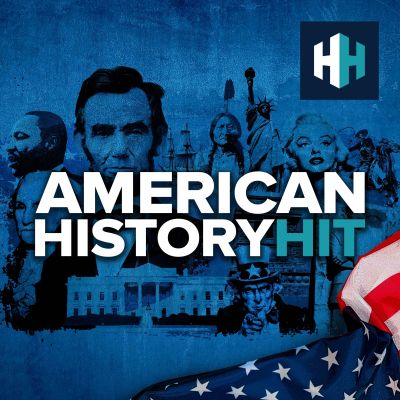Join Don Wildman twice a week for your hit of American history, as he explores the past to help us understand the United States of today. We’ll hear how codebreakers uncovered secret Japanese plans for the Battle of Midway, visit Chief Powhatan as he prepares for war with the British, see Walt Disney accuse his former colleagues of being communists, and uncover the dark history that lies beneath Central Park. From pre-colonial America to independence, slavery to civil rights, the gold rush to the space race, join Don as he speaks to leading experts to delve into America’s past. New episodes every Monday and Thursday. Brought to you by History Hit, the award-winning podcast network and world’s best history channel on demand, featuring shows like Dan Snow’s History Hit, Not Just The Tudors and Betwixt the Sheets.Enjoy unlimited access to award-winning original documentaries that are released weekly and AD-FREE podcasts. Get a subscription for £1 per month for 3 months with code AMERICANHISTORY - sign up at historyhit.com/subscribe.You can take part in our listener survey here.
https://shows.acast.com/american-history-hit
Gesamtlänge aller Episoden: 4 days 8 hours 28 minutes
episode 166: President Rutherford B. Hayes: The First Great Depression
Emerging victorious from an electoral quagmire in 1876, Rutherford B. Hayes became the 19th President of the United States.
Professor Mark Zachary Taylor joins Don to explore the first great depression and how Hayes navigated the US towards recovery from it.
From strike and unrest to growth and stability, how did Hayes lay the groundwork for economic prosperity?
Produced by Freddy Chick. Edited by Sophie Gee. Senior Producer was Charlotte Long...
episode 165: Founding Father: Who Was John Hancock?
An iconic signature on the Declaration of Independence - that is what John Hancock is best known for. But how did he come to be the first signatory? What was his role in the American Revolution?
Brooke Barbier joins Don in this episode to take us through the life and works of John Hancock, and to explain how he got the nickname, 'King Hancock'...
episode 164: The 1921 Murder Farm Massacre: Slavery After the Civil War
During the spring of 1921, eleven bodies were found in in rural Georgia. These men were victims of horrific murders, and also of a more widespread crime - peonage.
Whilst enslavement had legally ended with the surrender at Appomattox and the 13th Amendment, black people across the south were still being entrapped into debt slavery half a century later, in the Twentieth Century...
episode 163: President Ulysses S. Grant: The Myth of the Butcher
How does a heroic general of the Civil War become one of the lowest rated Presidents (at least until recently)?
To discuss Grant's commitment to reconstruction, civil rights, and the crushing of the Ku Klux Klan, Don is joined by Professor Anne Marshall. Anne is a historian of the Nineteenth century U.S. South and the Civil War in historical memory at Mississippi State University.
Produced by Freddy Chick. Edited by Sophie Gee. Senior Producer was Charlotte Long...
episode 162: Ulysses S. Grant & the Civil War
Strategic brilliance? Relentless determination? Unbeatable leadership and cooperation with Lincoln? How did Ulysses S. Grant distinguish himself in the Civil War?
Don speaks to Cecily Zander, a historian specializing in the Civil War era and the American West. Together, they discuss Grant's rise to General, his role in the war and why he has been known as 'the Butcher'.
Produced by Freddy Chick and Charlotte Long. Edited by Aidan Lonergan...
episode 161: The Rise & Fall of Al Capone
Al Capone is one of the most notorious gangsters in US history. His story of rags to riches, set against the backdrop of the prohibition era, is worthy of the many movies that it has inspired.
Violent mobster, genius businessman or semi-professional baseball player, who was the real Al Capone? To find out, Don speaks to Claire White, Director of Education at the Mob Museum in Las Vegas.
Produced and edited by Sophie Gee. Senior Producer was Charlotte Long...
episode 159: The Real Great Gatsby
A wealthy man in his early 30s. An army man. A German immigrant. A bootlegger. A lover. Who was Jay Gatsby? And if he was based on a real person, what do we know about them?
To delve into one of the most famous fictional characters of the 20th century (from one of Don's favourite authors, F Scott Fitzgerald) Don speaks to Joe Nocera. Joe is the host of a new eight-part investigation that delves into the shrouded mystery behind the person who claims to have inspired The Great Gatsby...
episode 158: President Andrew Johnson: Reconstruction & The First Impeachment
Three quarters of a million people dead in the Civil War. A country separated in to two. How do you join it back together? Do you punish the secessionists? How do you grapple with the question of enslavement? And who do you choose to be at the controls?
When Abraham Lincoln was assassinated in 1865, his Vice President, Andrew Johnson, became President. Johnson was a Southerner who had sided with the Union during the war...
episode 157: The Salem Witch Trials
More than 200 accused, 20 executed and a village plagued with hysteria. Were the Salem Witch Trials of 1692 and 1693 the work of superstition, a power struggle, fungus or actual witchcraft? What makes them stand out in the history of witch trials?
In this episode, Don speaks to Jessica Parr from Northeastern University about the alleged crimes, persecution and lasting memory of the so-called Salem witches...
